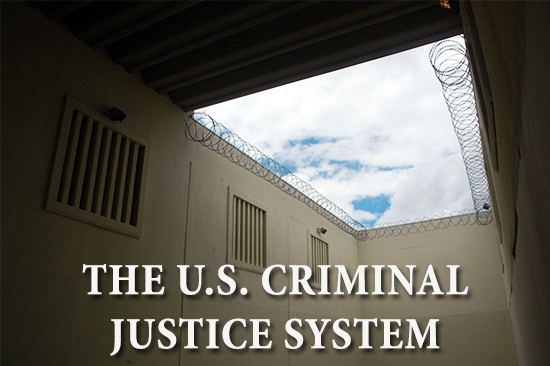The U.S. Criminal Justice System
 Our criminal justice system poses a real dilemma. There must be consequences to committing
a crime but we must ask ourselves whether the criminal justice system is actually
producing the results that we want or need.
Our criminal justice system poses a real dilemma. There must be consequences to committing
a crime but we must ask ourselves whether the criminal justice system is actually
producing the results that we want or need.
According to the World Prison Population List, the United States has a greater percentage of its population in jail than any other country in the world. In fact, with over 2 million people incarcerated, the United States has almost as many people in prison and pre-trial detention as China, an authoritarian country with over four times the population of the United States.
Disproportionately, those in jail come from lower socio-economic backgrounds. Inmates are more likely to be male, African American, and/or poor. Once a person has served time in jail, economic opportunities become limited, and there are few people who seriously suggest that our criminal justice system has a significant focus on rehabilitation.
It has been estimated that this year over a million children in the United States will be homeless, and many more will live in substandard conditions. These are conditions that can understandably sway anyone towards criminal activity. We spend less money on education for one child in a year than a year's cost to keep an inmate incarcerated.
We need to ask ourselves whether our tax dollars could be better spent by investing more in educational opportunities and social support for these children? Could this money have been better spent by creating more economic opportunities and jobs in inner cities and poor rural areas?
Could we do more to prevent crime, instead of just punishing it?
The authors would like to thank Ms. Katie Neel, MPH, for conducting initial fact-checking
for this article. The authors would also like to thank Alli Proffitt, Kate Etue, Brad
Lifford, and Dara Young for remarkably thoughtful and insightful editing and other
invaluable contributions.
This article reflects the personal views of the authors and does not necessarily represent
the views of their employers, co-workers, or others.
| Title | Info |
|---|---|
| Blog Posts |
Natural and Man-Made Disasters The U.S. Criminal Justice System Creativity and Freedom of the Press |
 Stout Drive Road Closure
Stout Drive Road Closure 

